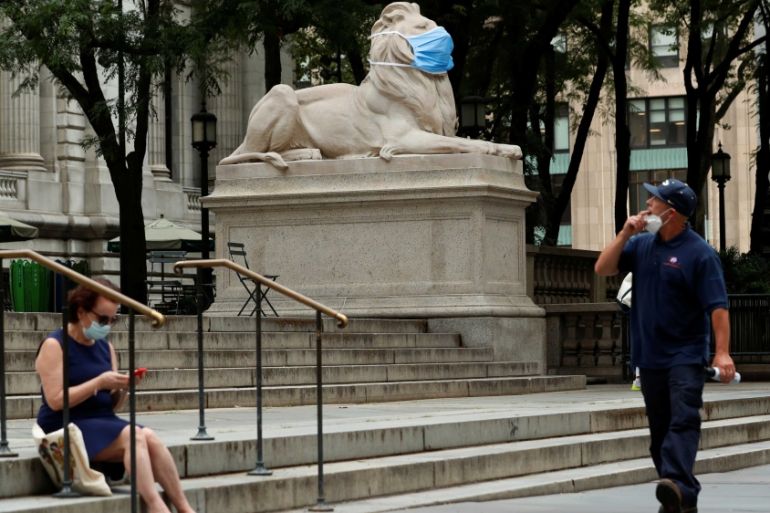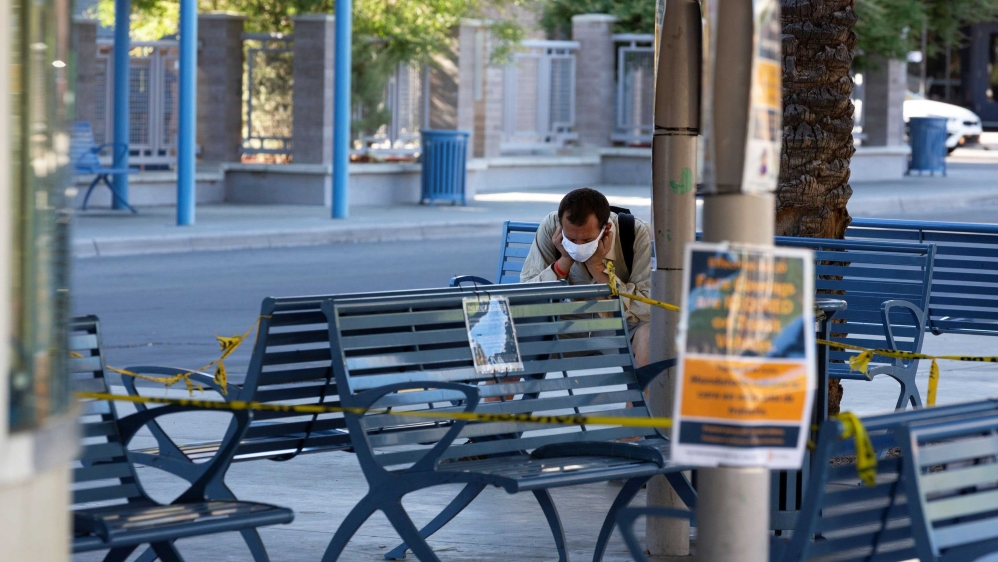Sunbelt’s COVID-19 cases spike; some states back off on reopening
Record high cases across the United States Sunbelt have led other states to put their own reopening plans on hold.

Arizona recorded more coronavirus deaths, infections, hospitalisations and emergency-room (ER) visits in a single day than ever before in a crisis Wednesday across the United States Sunbelt that sent a shudder through other parts of the country and led distant states to put their own reopening plans on hold.
In Florida, hospitals braced for an influx of patients, with the biggest medical centre in Florida’s hardest-hit county, Miami’s Jackson Health System, scaling back elective surgeries and other procedures to make room for victims of the resurgence underway across the South and West.
Keep reading
list of 4 itemsMexico’s teachers seek relief from pandemic-era spike in school robberies
‘A bad chapter’: Tracing the origins of Ecuador’s rise in gang violence
Why is the US economy so resilient?
Cases in Texas rose by 8,076 on Wednesday, the highest daily increase since the pandemic started.
On Wednesday, Vice President Mike Pence travelled to Arizona, where cases have spiked since stay-at-home orders expired in mid-May. Arizona reported record single-day highs of almost 4,900 new COVID-19 cases, 88 new deaths, close to 1,300 ER visits and a running total of nearly 2,900 people in the hospital.

Florida recorded more than 6,500 new cases – down from around 9,000 on some days last week, but still alarming – and a running total of over 3,500 deaths. Ahead of the Fourth of July holiday, counties in South Florida are closing beaches to fend off large crowds that could spread the virus.
The increase in cases has been blamed in part on what New Jersey’s governor called “knucklehead behaviour” by Americans who are not wearing masks or obeying other social-distancing rules.
‘Not going back’
“Too many people were crowding into restaurants late at night, turning these establishments into breeding grounds for this deadly virus,” Miami-Dade County Mayor Carlos Gimenez said while forbidding restaurants with seating for more than eight people from serving customers inside from midnight to 6am.
Health experts say the virus in Florida and other Southern states risks becoming uncontrollable, with case numbers too large to trace.
Marilyn Rauth, a senior citizen in Punta Gorda, said Florida’s reopening was “too much too soon”.
“The sad thing is the COVID spread will probably go on for some time though we could have flattened the curve with responsible leadership,” she said. “Experience now has shown most people won’t social distance at beaches, bars, etc. The governor evidently has no concern for the health of the state’s citizens.”
Florida Governor Ron DeSantis, a Republican, said on Tuesday that the state was “not going back” on reopening.
|
|
The soaring numbers have raised fears that many other states could see the same phenomenon if they reopen, too – or that people from the South and West could spread the virus to other regions.
Some distant states and cities that seemed to have tamed their outbreaks, including Colorado, Virginia, Delaware and New Jersey, hit pause or backtracked on some of their reopening plans for bars and restaurants. And New York and New Jersey are asking visitors from 16 states from the Carolinas to California to quarantine themselves for two weeks.
New York Mayor Bill de Blasio said the city is delaying its resumption of indoor dining at restaurants, and not because of any rise in cases there.
“Even a week ago, honestly, I was hopeful we could. But the news we have gotten from around the country gets worse and worse all the time,” he said.
The number of confirmed cases in the US per day has roughly doubled over the past month, hitting 44,800 on Tuesday, according to a count kept by Johns Hopkins University. That is higher even than what the nation witnessed during the deadliest stretch of the crisis in mid-April through early May.

Dr Anthony Fauci, the nation’s top infectious-disease expert, warned on Capitol Hill on Tuesday that the rise across the South and West “puts the entire country at risk” and that new infections could reach 100,000 a day if people don’t start listening to public health authorities.
|
|
“When you have an outbreak in one part of the country, even though in other parts of the country they’re doing well, they are vulnerable,” Fauci said.
The outbreaks in Florida, Arizona, Texas and California have already forced those states to reverse course and take such measures as shutting down bars and beaches and curbing restaurant capacity.
The virus in the US is blamed for more than 2.6 million confirmed cases and over 127,000 deaths – the highest toll in the world, by Johns Hopkins’s count. Worldwide, the number of infections is put at more than 10.6 million, with over half a million deaths.
The real numbers in the US and globally are believed to be significantly higher, in part because of limited testing and mild cases that have gone unrecorded.
The number of deaths per day in the US has continued to drop over the past week and is down to an average of about 550, compared with a peak of around 2,200 a day in mid-April, according to an Associated Press analysis. But experts note that deaths are a lagging indicator – it takes time for people to get sick and die – and they warn that the trend could reverse itself.
In New Jersey, where cases had been declining since late April, Governor Phil Murphy announced a pause on Monday, in part because of people not wearing masks and not observing social distancing.
“Unfortunately, the national scene, compounded by instances of knucklehead behaviour here at home, are requiring us to hit pause on the restart of indoor dining for the foreseeable future,” he said.